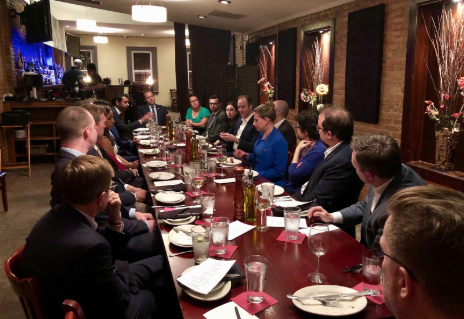On Thursday, September 19th the Millennial Action Project convened members of the Congressional Future Caucus and leading stakeholders from academia, industry, and government to discuss the global rise of artificial intelligence. Over dinner, attendees discussed the state of domestic AI policy, the progress of computing advancements, the persistent need for human capital, and the debate around data regulation. Throughout the evening we heard encouraging consensus from most parties involved who agreed broadly on the transformational nature of this technology and the need for more urgent U.S. leadership.
The night’s discussion began with a single question posed to the table: “What is the one thing Congress needs to do to ensure a beneficial proliferation of AI technology?” Answers ranged from the specific to the unlikely, but most rejected the idea that AI will lead to insuperable job losses from automation, or a total extrication of personal privacy. Instead, participants chose to highlight the progress being made around these concerns and to point out the numerous upsides. Many urged the federal government to adopt a comprehensive set of data guidelines, others focused on the need to develop training and educational programs in AI, all agreed on the imperative of changing the narrative around AI and encouraging engagement by the government and by private citizens to mitigate fears.
To establish this path forward, the federal government will need to assist in the development and dissemination of a new kind of technological literacy. Without a capacity to understand the direction AI is moving in, regulatory action will more than likely be misguided and the federal government will miss opportunities to employ AI in its own operations. Nevertheless, the federal government exerts tremendous control over access to, and funding for the constituent parts of AI advancement, those being: human capital toward algorithm development, data regulations, and access to computing power. By understanding the federal government’s role in shaping these domains, and bringing those involved in these areas into the fray, Congress can responsibly chart a path forward and position the U.S. for global leadership.
Precisely because this technology will change so much of how we work and live in a radical way, we must lean-in now and not let fear of uncertainty leave the U.S. clawing from behind. As emphasized at the table, artificial intelligence reflects the ethical and moral frameworks within which it is developed. As peer competitors push for an edge, now is not the time for prevarication, but for meaningful action for our future.

